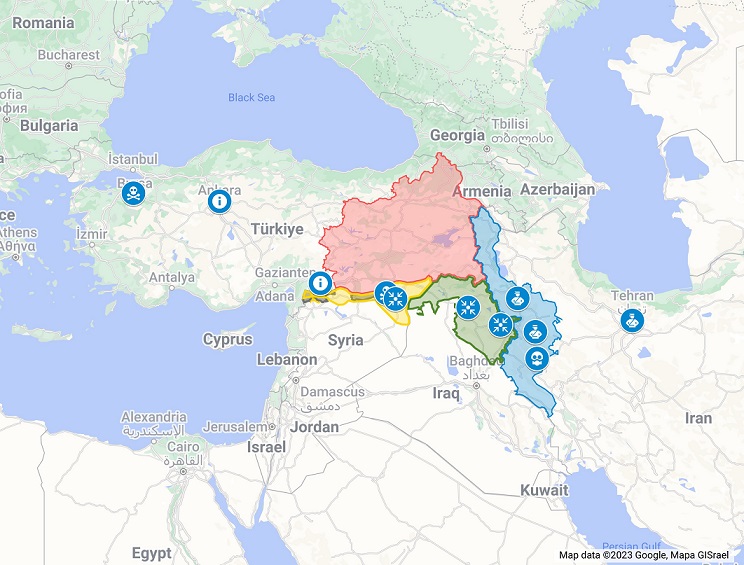1.2K
A weekly brief of events occurred in the Kurdistan regions of Iran, Iraq, Syria, and Turkey.
Iran
- Unknown perpetrators have poisoned more than 1000 girls in Iranian schools since November. The Iranian regime claimed it was investigating the incidents, but several radical organizations linked to the regime are suspected of carrying out the attacks to discourage female education and exact vengeance for schools’ roles in the anti-government protests that began in September 2022. Several Kurdish girls and teachers in two Kermanshah schools were targeted in the latest attack last week. Additionally, the Islamic Revolutionary Guard Corps’ (IRGC) Basij militia pressured several girls’ schools in Sena to join its paramilitary program known as “Ready to Defend.” The program is often imposed on schools and provides teenagers with military training, but many students refuse to participate.
- The Hengaw Organization for Human Rights’ latest report claimed Iranian authorities arrested 76 Kurds in February on charges related to anti-government protests. Iranian security forces arrested a number of people in Bokan, including three teenagers, Rebaz Tamami, Suhail Karimogulan, and Mardin Danazan, and two relatives, Fatah and Mani Blendgrani. Concurrently, Tehran’s Islamic Revolutionary Court sentenced a Kurdish engineer named Adel Nadimi to two years in prison and 20 lashes for “disrespecting the supreme leader.” On a separate note, the U.S. sanctioned several companies and their vessels for facilitating Iran’s trade in petroleum and petrochemicals. At the same time, several U.S. senators, including Senate Foreign Relations Committee Chairman Bob Menendez, called for stricter measures against the regime.
Iraq
- United Nations (UN) Secretary-General Antonio Guterres followed up on his visit to Baghdad by meeting with several high-ranking Kurdish officials in Erbil, including President of Kurdistan Region Nechirvan Barzani. “The latest political developments in Iraq and the Kurdistan Region, relations between Erbil and Baghdad and the ongoing efforts to resolve their existing differences, the agenda of the Iraqi Federal Government, and the status of Sinjar District were all highlighted,” read a statement from Barzani’s office. Guterres described his meetings with Iraqi and Kurdish officials as fruitful and said, “In my discussions, both here and in Baghdad, I sensed a genuine commitment to move forward, and I urge all to translate this commitment into reality.”
- The Kurdistan Democratic Party (KDP) and the Patriotic Union of Kurdistan (PUK) delayed their second scheduled meeting to discuss Iraqi Kurdistan’s election laws. Though the PUK and KDP remain at odds over several key issues, the mediation efforts launched by President Barzani have convinced PUK ministers to return to the Kurdistan Regional Government (KRG) Cabinet. The KDP and PUK also agreed to hold elections in 2023.
Syria
- The Syrian Democratic Forces (SDF) released a report highlighting Turkish attacks on northern Syria in February, which included two drone strikes and 24 attacks with heavy weapons and tanks. The SDF claimed the attacks killed four civilians and caused numerous injuries. The SDF also refuted Turkey’s claim it killed the planner of the November 2022 Istanbul bombing. “We affirm that the aforementioned person has no connection with our forces, and he is a civilian far removed from military and political activities, and the murder that affected him is added to the record of crimes committed by the occupation and still against our people,” said the SDF.
Turkey
- On March 6, Turkey’s Ministry of Foreign Affairs summoned U.S. Ambassador Jeff Flake to express dissatisfaction with Chairman of the Joint Chiefs of Staff Mark Milley’s trip to the Autonomous Administration of North and East Syria (AANES). Milley visited a U.S. base in an area controlled by the AANES and the SDF to evaluate the status of the counter-ISIS (Da’esh) campaign known as Operation Inherent Resolve on Saturday. Turkey opposes the U.S.-SDF partnership and has labeled the latter a terrorist organization.
- The nationalist IYI Party left the main opposition coalition known as the National Alliance on March 4. The National Alliance, also known as the “Table of Six,” opposes President Recep Tayyip Erdogan and his ruling People’s Alliance. Initially, IYI leader Meral Aksenar took issue with the National Alliance’s selection of Kemal Kilicdaroglu as a presidential candidate for the upcoming May elections and insisted upon either the Mayor of Istanbul, Ekrem Imamoglu, or the Mayor of Ankara, Mansure Yavas, both of whom are from the Republican People’s Party (CHP). That said, Aksenar and the IYI rejoined the National Alliance on March 6 after Imamoglu and Yavas were introduced as potential vice presidential candidates. The pro-Kurdish People’s Democratic Party (HDP) remains opposed to Erdogan’s ruling coalition and its anti-Kurdish policies but has yet to comment on Kilicdaroglu’s candidacy.
- On March 5, Diyarbakir’s (Amed) soccer team, Amedpor, traveled to Bursa for a match with Bursaspor (Bursa’s local team). Bursapor fans chanted Turkish nationalist and anti-Kurdish slogans throughout the game and threw trash, knives, and bullets onto the field. The night before the game, Amedspor players were targeted with fireworks while sleeping in their hotel, and Amedspor fans were attacked before, during, and after the game. Fans also held signs celebrating Turkish authorities’ assassination, torture, and abduction of Kurds during the 1990s. HDP co-chairs Pervin Buldan and Mithat Sancar condemned the racist attacks and called for league officials to resign.
- A Turkish Police Chief from the Islahiye district of Gaziantep was arrested for stealing humanitarian assistance intended for earthquake survivors. As of March 6, February’s earthquakes have killed 45,089 people in Turkey. Within the country, the World Bank estimates immediate damages at $38 billion, or approximately 4% of Turkey’s GDP. The Turkish Enterprise and Business Confederation, however, estimates the total cost of the quakes to be $84.1 billion. Further, the HDP formally requested a Parliamentary Survey “be opened to determine the administrative, institutional, political and legal responsibilities of the disastrous Maraş-centered earthquakes.” The request includes a long list of governmental failures in the face of humanitarian catastrophe and is part of the HDP’s campaign to hold the correct parties responsible and prevent future devastation.

